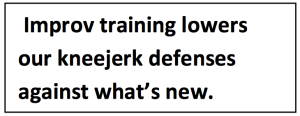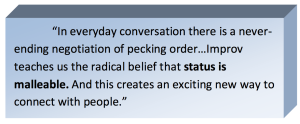Executive Summary
Status is one hot potato in the workplace. Who has it? How to get it? This article asks “What do Applied Improvisers bring to the table—at work?” What do we know about pecking order on stage that sparks collaboration, unleashes creativity and frees people up? What is it about the very DNA of Improv that helps people’s handle rapid change and make faster decisions? This article is excerpted from my workshop Cool under Fire©
 Improv is having a Cultural Moment
Improv is having a Cultural Moment
Improv is having A Moment. I can attest firsthand that great innovation is coming out of Applied Improv in Francisco right now. Improv is an antidote to the avalanche, the time suck of tech. People are hungry for Improv’s brand of high quality human connection.
When Applied Improvisers do corporate workshops, our Improv Games temporarily remove the shackles of organizational STATUS. Suddenly, deliciously, leaders and their direct reports are freer…turned on to find the best offer and run with THAT! All Eyes are on the Prize: fast decision and best outcome. The best ideas are freed up to come from whomever. That’s why I call it the Dance of Status, this never-ending see-saw in work and life.
What Can Improv Status Games Teach Companies
Applied Improvisers bring what we’ve learned on stage–out into organizations. Status games are more poignant here—where serious STATUS battles are raged over turf, budgets, creative direction, power and fame.
New improvisers think of STATUS games as just fun. High status = good. Low = less. King Vs. butler. Boss Vs job seeker. Yet the takeaways are far more important. When we acknowledge what’s really going on through Improv Status Games, it’s not only hilarious but it frees up collaboration. The whole group bonds and can get to somewhere wilder, more exciting, more true about human nature.
Improv training lowers our kneejerk defenses against what’s new.

Applied improvisers turn years of Improv play into corporate counsel. Improv STATUS games help leaders be more approachable–AND let Direct Reports speak up (without being uppity). Now the best idea can win, stripped of rank. Understanding STATUS through an Improv lens informs us how to walk into a room, influence pecking order, or lower our status to make others feel safer. Humans tend to pick a status comfort level and park there. But rigid roles stifle creativity. And isn’t the goal INNOVATION?

Improv comedy founder Keith Johnstone said, “In everyday conversation there is a never-ending negotiation of pecking order. “
Example: If an admin publicly challenges a VP (with wit and humor)— and it goes well–the staffer’s status is momentarily raised.
Johnstone continues, “The belief that status is malleable creates an exciting new way to connect with people.” Portland Improv company, On-Your-Feet’s Robert Poynton adds in his book, Everything’s an Offer, “By understanding the upside & downsides of status, we make conscious choices Vs trotting out habitual responses.”
Business Hungers for Improv’s Agility
Some people find Improv scary– but sexy. Once people understand what an agility teacher Improv is, they see we’re onto something big. Companies move at warp speed: re-orgs, takeovers, downsizing and midnight meetings with managers in Mumbai. Improv training lowers our kneejerk defenses against what’s new. Improv keeps us hyper-alert to the best offer. We pre-judge less and are changed by what we hear more. We’ve learned to run with what’s given– even a preposterous STATUS shift:
Oh, Queen Elizabeth? Soooo, you’re moonlighting as a pizza delivery guy. How’s the pepperoni tonight?
As consultants David Bradford & Allan Cohen discuss in Influencing Up, high status can make leaders deaf (insulated with their own elite) –and staff mute (afraid to tell truth to power). It’s human nature. The great thing about Applied Improv for business is that it lets the best ideas lead the dance. Status IS malleable; a radical thought given how corporate people revere org charts.
Status is Deeply Animal. Bring on Neuroscience.
Status is deeply animal. It triggers the threat response deep in our 500 million year old Monkey Brains—the auto response that instinctively pulls away from the hot stove.
A growing group of advanced Presentation Skills coaches reference Neuroscience. Neuroscience helps me explain Performance Anxiety in public speaking. Neuroscientists now know HOW the threat response is wired in our DNA. This monkey part of our brain, the auto responder is pure Fight OR Flight. There’s no distinction between cavemen fleeing from lions OR us dreading a tough Q&A session at work. Same threat response.
Neuroscientists Eisenberg & Lieberman, in “Trends in Cognitive Science”, 2004 conclude, “The same primitive part of our brain, the Amygdala, literally flashes and lights up in a threatening business situation– as hearing footsteps behind us on a lonely nighttime street.”
Dr. Subramanian, “Journal of Cognitive Neuroscience“, 2007 found that “…when we are threatened, we can’t read subtle signals in problem solving. With an overly vigilant Amygdala we generalize, err on the safe size, and avoid opportunities.”
Translation: It’s not just you freaking out at work or on stage. It’s just our DNA.
Bottom Line
At work people take STATUS very seriously: Serious as a promotion. Serious as a mortgage. Applied Improv—especially STATUS Games—help earn consultants a respected seat at the table. At the global trade group for Applied Improvisers, AIN’s President Paul Z. Jackson declared Improv in its 3rd Age.
Improv was first to help people e have a good time
Next it was in vogue for personal development.
Now Improv training is being viewed as one gateway to innovation.
By Marianne Fleischer © Printed Applied Improv Network, 2013. Reprinted 2014. Download PDF here.
Marianne Fleischer is an inde Speechwriter and Speech Coach. Based in San Francisco, she offers private Speech Coaching, Corporate Communications strategy, creative counsel and her COOL UNDER FIRE corporate and public workshops. She is also a TV and events writer-producer and former newscaster. She has being doing Improv off and on for years.
